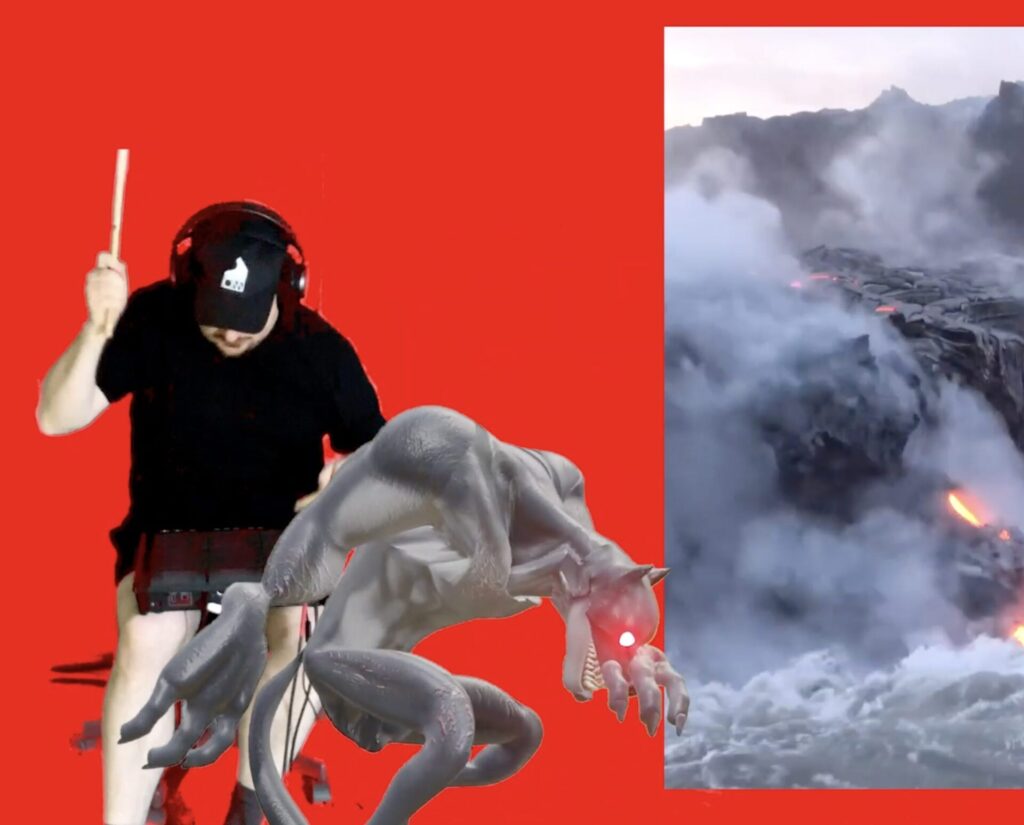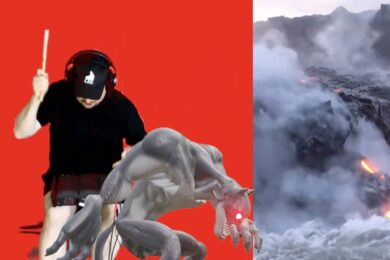From Sunik Kim’s dense noise monoliths to aya’s 4am horror stories, much of the best contemporary electronic music embodies the inherent chaos of life in 2025. This music is often intimidating, jarring, or straightforwardly unpleasant, born from circumstances that Brady Corbet’s Vox Lux snappily termed “a gaudy, unlivable present” – or, in other words, a Decadent Stress Chamber.
But despite this ominous title, Keith Rankin’s fifth album as Giant Claw represents a heel turn from the nihilistic excess of the zeitgeist. Decadent Stress Chamber is maximalism of possibility: a commingling of worldly frenzy and human warmth that feels positively utopian. Across eight tracks, Rankin re-shapes elements of seemingly hundreds of genres – K-pop, yacht rock, industrial goth, prog – into big, earnest pop songs. The result is alchemic, like the noise from a fast-moving dial on a radio somehow producing a rock opera.
Also a visual artist and designer, Rankin has been making solo music as Giant Claw since 2010, alongside releases as a member of electronic collective Death’s Dynamic Shroud. He co-runs the excellent label Orange Milk, which specialises in electronic overwhelm (Lauren Bousfield) punctuated by moments of stark elegance (Lucy Liyou) and synthesised emotion (More Eaze). Giant Claw is something of an ambitious amalgamation of all these modes. Decadent Stress Chamber presents Rankin’s idea of ‘free pop’, which retains the sensibility of pop music with an otherwise free-wheeling, everyone’s-welcome attitude to genre and structure, invited in via a kaleidoscope of collaged samples.
Like Lauren Bousfield’s excellent 2023 Orange Milk release Salesforce, Decadent Stress Chamber could be read as a conceptual reaction to late capitalism. But where Bousfield honed commercial slop and Disneyland imagery into an ironic consumerist nightmare, Rankin treats each piece of pop cultural detritus as a jewel to polish and finely cut. Opener ‘Pulled Me In Dark’ is formed around a sample of Selena Gomez’s 2015 track ‘Nobody’, a couple of chopped up phrases which twirl and repeat over an evolving composition of midi guitar and stadium-sized drums. The vocals are lyrically nonsensical when reassembled, but somehow still evocative of romance and yearning – we understand the emotional intent, like when we hear a pop song in an unknown language, or manipulated in MAX by Carl Stone. Rankin doesn’t just speak the universal language of pop, but can recreate its mysteries from shattered remains.
Rankin uses vocal samples throughout Decadent Stress Chamber, as raw material for emotional meaning and to imagine new kinds of pop. On ‘Something To Believe In’, Ariana Grande becomes the frontperson of a post-hardcore/space-rock hybrid band, with her vocalisations chopped into silk layers and percussive elements both. ‘Life Worth Going Through’ extracts the bare bones of t.A.T.u.’s 2002 hit ‘Not Gonna Get Us’ and forms it into a tower of gothic melodrama, its lovers-on-the-run lyrics recontextualised for a dystopian future.
During a fascinating track walkthrough for ‘Pulled Me In Dark’ on YouTube, Rankin states his ambition to use his sampling process to recreate a ‘live band’ sound. It wouldn’t be surprising if ‘Desire Despair’, the most traditionally structured verse-chorus song on the album, also had similar origins. Its driving drums, crunchy guitar and melodic bass are facsimiles of organic sounds, so convincing that the girl-boy duet that it accompanies could almost be real too – until the voices falter and reveal that they’re synthetic. This breakdown in code triggers a jolt in the music, which switches into something like bombastic hold music. It’s the specific synth-rock melancholy of New Order or Hot Fuss, with an added layer of tragic, post-human storytelling.
There’s less straightforward narratives here too. On ‘No Life’, the listener is invited on a cruise around a landscape of plastic exotica, aerobics-ready electropop, vaporwave and speed metal. The title track is the only song without an obvious vocal sample, and is all the more unpredictable without this familiar anchor. Like a microcosm of the album’s shifts in mood and mode, its countermelodies are passed between instruments as the sonic surroundings warp. It’s simultaneously impossible to keep track, and as smooth and effortless as chrome.
The album ends with ‘Life Worth Going Through (redo)’, a climax of skill, drama and poignancy. Rankin uses the t.A.T.u. sample again, this time transforming it into a maelstrom of choral harmonies, then screams to match sky-high drums, then a sigh malfunctioning in acid rain. In the rock opera of the album it’s the big emotional finish, the dialled-up reprise, reduced at the end to a disintegrating electronic pulse. We might feel wrung out at the end, battered by the volume and weight of everything we’ve been though – but we’re left clinging onto something real, the remnants of humanity scraped from the dregs and brought into the sun.



